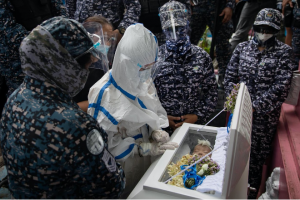By: Elizabeth (Lizzy) Wright
Journal of Global Rights and Organizations, Associate Articles Editor
MANILA, Philippines – On October 9th, 2020, new mother Reina Mae Nasino experienced the worst tragedy possible; her three-month-old baby, River Emanuelle died of pneumonia. However, Nasino’s tragedy greatened when Manila Regional Trial Court 47 decided she would only be allowed to grieve her daughter over a three-day furlough from the jail she was being held in. This was only for the court to amend its decision the next day and allow her 6 hours to attend River’s wake.

From the beginning of her case, Reina has been fighting against the Philippine Government’s controversial rule. Housing in the Philippines is a major issue, and the city of Manila is said to have the highest rate of homelessness in the world. Reina is a known activist, as a member of the group known as Kadamay. Reina and Kadamay were involved in protesting the privatization of low-income governmental housing by occupying an old homeless shelter that was due to be torn down. This led to officials going to Reina’s residence, searching it, allegedly finding unauthorized firearms, and arresting her. Reina has maintained her innocence and claims that officials planted the weapons.
At the time of her arrest, Reina did not yet realize that she was pregnant with baby River. She only realized she was pregnant during a medical examination in jail a few months later. For the first month of River’s life, she was allowed to remain with Reina, and during this time, she petitioned the court to allow her to breastfeed River for her first year. The court denied this petition and forcibly removed River from Reina’s care only four weeks after birth. Reina then asked the court for a temporary release related to COVID-19 jail downsizing; she was denied.
During the two months between River’s separation from her mother and her death, her health declined significantly and she was hospitalized. Knowing this, Reina continued to ask the court to reunite her with River but was ultimately denied. Reina’s family argues that River’s sickness was due to the inability to breastfeed.
As previously mentioned, Reina was allowed to attend River’s wake for only six hours. During the wake, Reina was escorted by 20 armed law enforcement individuals. Law enforcement then broke up the wake early and had the hearse carrying the coffin speed away. The family chased the hearse on foot as it left. These events have sparked an international outcry and scrutiny regarding the way mothers are treated while incarcerated in the Philippines.
Pregnancy and motherhood are two key things that make female incarceration significantly more complicated than male incarceration. Different countries have created remedies for this issue. For example, some countries allow babies to remain with their incarcerated mothers for up to four years.
The actions of the Philippine Government inflicted serious trauma on Reina, River, and their family. The Government claims that separating babies from their mothers, as a rule, is in the best interest of the child. However, this reasoning is flawed. These babies often end up in foster homes and do not reap any of the benefits that come with being physically close with their mothers. Studies show that physical closeness between mother and baby is good for both; it creates feelings of security for the baby and gives the mother an awareness of the needs of the baby.
Reina and River’s case is, unfortunately, one of many that demonstrate the need for incarceration reform in the Philippines and other countries, like the United States, that routinely separate babies from their mothers.
For further information, please see:
BBC News – Anger over death of baby separated from jailed mother – 15 Oct. 2020